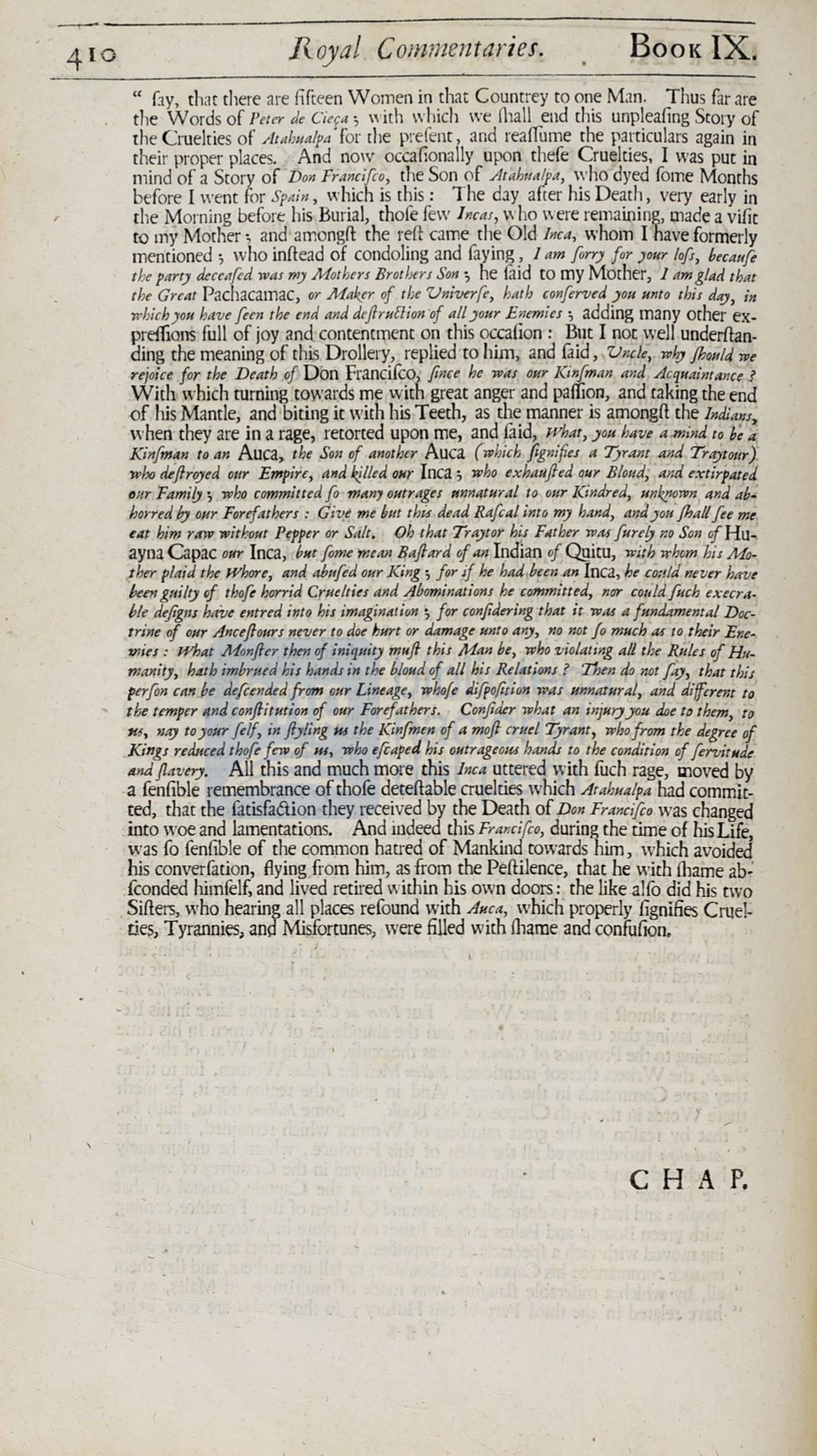

410
Royal
Commentaries.
BooK
IX.
" fay, that rhere are fifreen Wornen in that Countrey to one Man. Thus far are
the Words of
Pe1rr,- de
Ciefª ;
wich which
we
íl1~1l end chis unp\eafing Story of
the Cruelries of
A1ahualpa
for rhe preíent, and reaífurne the pamculars again in
their proper places. And now occaÍlonally upon thefe Cruelties, I was puc
in
mind of a Story of
Don Francifco ,
the Son of
Atahualpa,
who dyed fome Monrhs
before
I
weiít for
Spain ,
which is chis : The d:iy after his Deach, very early in
the Morning before his Burial, thofe few
Incas,
who were rernaining, i;nade a vific
to
my
Morher; and amongíl: che reíl: carne rhe Old
Inca,
whom
I
bave formerly
men'tioned ; who inílead of condoling and faying,
1
am forry for your lofs, becaufe
the party decurfed was my M others Brothers Son;
he faid to rny Morher,
1
amglad that
the Great
Pachacarnac,
or Makp of the Vniver(e, hath conferved you unto this dt!J, in
whichyou have feen the end and deftruétion ·of ali your Enemie.r
;
adding rnany other ex–
prefiions
foil
of joy and_ concencment on chis occafion :
But I
noc .well underíl:an–
ding che rneaning of this Drollery, replied·to
hip,,
and faid,
V.ncli, wh; /hould we
rejoice for the Death .of
Dbn
Franci[co,
fince he wa.r our Kinfman and Acquaintance
?
Wích whiéh turning tow.ards me with great anger and paffio11, and raking the end
of his Mantle, and •biting ic wich bis Teeth, as the rnanner is amongíl che
Jndi,,m.r
when chey are in a rage, recorred upon me, ai:id faid,
what, you have a.min_d to b;
~
Kinfman to an
Auca,
the Son of anothe-r
Auca
(
which ftgnifie.r a Tyrant and Trt!]tour)
who
d;¡/royed our Empire, and kjlled
OHf
Inca ;
who exhatJfted our Bloud; and extirp~ted
OHr Family
;
who committed fo many outrages ,mnatural to our Kindred, unkziown ·and ab–
horred
6y
oµr Forefathers : Giv.e me but thú dead Rafea! into my hand, andyou'jhallfee
me
eat
him raw -without P~pper or Salt. Oh that Traytor h{.r hther
WM
furely no Son of
Hu..,
ayna Capac
our
Inca,
but fome rnean Jiaft11rd ofan
Indiau
of
QgÍtu,
with whom his Mo–
.ther plaid the whare, and abufed our King
;
for
jf
he had
1
been.a1:
Inca,
he co;J/d never have
beengui!ty
of
thofe horrid Crueltie.r and Abomination.r he committed, nor could fuch execra–
ble dejigns have entred into hi.r imagination
;
for confidering that
it.
WM
a fundamenta! Doc–
trine of our Anceftour.r never to doe hurt or damage unto any, no not fo much
M
to their Ene–
wies : what M onjler thm
of
iniquity 71Juft thi.r J!,ían be, who violating a/L the Rules
of
Hu–
manity, hatb imbrued hi.r hand.rin the b!oud of ali hi.r Relation.r
?
71,en
do
not fay, that thii
perfon canje defcended from our LinMge, whofe Jifpofttion wa.r unnatural, and dilferent to
..
the temper JJnd conftitution of our Forefather.r.
Confider what an injuryyou doe to them, to
u.,
11t!J toJ'OHr felf, in ftyling
UI
the Kinfmen of
a
moji cruel Tyrant, who from the degree
of
.King.r reduced thofe f
ew
of
m,
who efcaped hi.r outrageom hand.r to the condirion
of
fervit,lde
and flavery.
Ali chis and much more chis
Inca
utcered with fuch rage, tlloved
by
a feníible remembrance ofchofe deteílable cruelties which
Atahualpa
had cornrn1t–
ted, thac che facisfafüon rhey.received by the Deach of
J)on Francifco
was changed
inco woe and larnencations. And indeed chis
Fr~nci(co,
during ~he time of l1is Life,
was fo fenfible of che common barred of Mankind towards lum, which avoided
his converfation, flying from him, as from che Peíl:ilence, thac he with fhame ab;
fconded hirnfelf, and lived retired within bis own doors: the like alfo did
bis
cwo
.Siílers, who hearing.all places refound wich
Auca,
whidi properly ·fignifies
Cn1el.
rie:;, Tyrannies,
and
Mi~forcunes, were fillecj with ihame and confufion.
CH A P.














